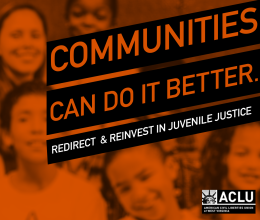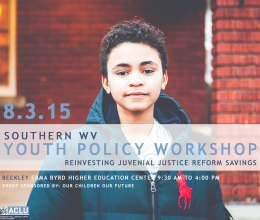
There is no justice for children caught up in the so-called juvenile justice system. Children in West Virginia are housed in facilities that for all intents and purposes are prisons. They can spend long periods of time in the facilities, sometimes for non-criminal status offenses. ACLU-WV will continue to reform the juvenile justice system through truancy reform, reducing institutionalization, increasing community-based alternatives, eliminating racial status, LGBTQ status and disability status disparities, reforming school discipline practices, and ending the school-to-prison pipeline.
West Virginia made historic strides in the 2015 legislative session by reforming our state’s broken juvenile justice system. Although the reform is a meaningful step in the right direction, the ACLU-WV turns its attention to ensuring that the state remains committed to making necessary reforms. West Virginia is projected to save at least $20 million due to the reforms passed. The ACLU-WV will push to ensure that those savings are reinvested into programs necessary to make lasting change, generate even more savings, and best serve our youth.
The ACLU-WV is committed to reforming juvenile justice from the ground up. This means we need to reverse the trend of criminalizing childhood behavior, ensure that legal rights are robust and robustly enforced when there is contact with the system, that racial disparities are erased, and that the emphasis is on rehabilitation in the least restrictive setting. Here are a few issues we're actively working on:
Classrooms Not Courtrooms - School discipline is increasingly a gateway to the juvenile justice system. In West Virginia, a lack of community-based alternatives, means that kids who get sent to court are often placed in in “out-of-home facilities” – a nice way of saying juvenile detention – which is costly and ineffective. Classrooms not Courtrooms seeks to combine school-based diversion and school-based mental health in an attempt to stop the school-to-prison pipeline. Download our one-pager
More Mental Health Providers, Fewer Cops in Schools - Kids don't belong in jail. The juvenile justice system should not be the gatekeeper to services for at-risk youth. System involved youth are more likely to drop out and more likely to enter the adult system. Funding for counselors, peer coaches, and social workers is a more cost-effective way to improve behavior and school safety. Download our one-pager





